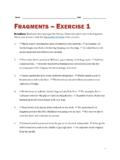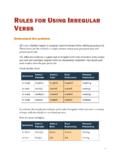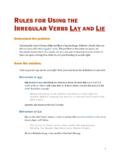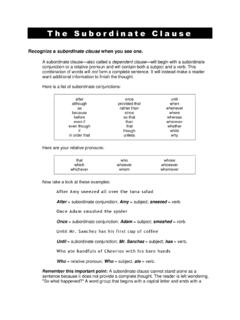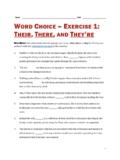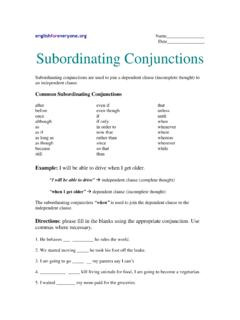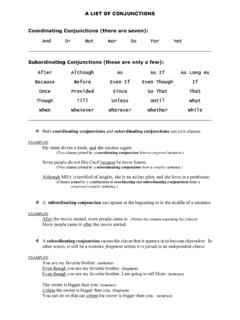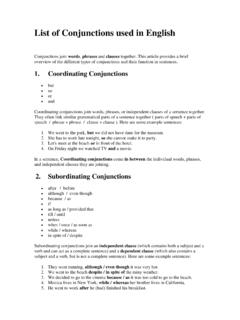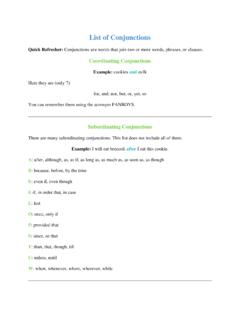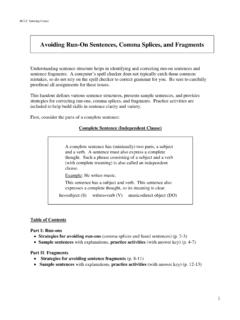Transcription of T he Subor dinat e C onjuncti on
1 T h e S u b o r d i n a t e C o n j u n c t i o n Recognize a subordinate conjunction when you see one. Some sentences are complex. Such sentences have two clauses, one main [or independent] and one subordinate [or dependent]. The essential ingredient in a complex sentence is the subordinate conjunction: after although as because before even if even though if in order that once provided that rather than since so that than that though unless until when whenever where whereas wherever whether while why The subordinate conjunction has two jobs.
2 First, it provides a necessary transition between the two ideas in the sentence. This transition will indicate a time, place, or cause and effect relationship. Here are some examples: L oui sa wil l w as h t he sin k fu ll of h er dir t y di sh es once h er room ma te Sh ane c l e ans hi s s tu bbl e a nd glo bs of s hav in g c re am from th e ba thr o om s ink. We l oo ked on t op o f the r efri gera t or, wher e Jen ny wi ll o ft e n hi de a ba g of c hoc o la te c hip c oo kie s. Because h er t ee th were c h at ter in g i n f ear, L yn da c l enc h ed her jaw m usc l e w hil e w a it ing for h er t urn to aud it io n.
3 The second job of the subordinate conjunction is to reduce the importance of one clause so that a reader understands which of the two ideas is more important. The more important idea belongs in the main clause, the less important in the clause introduced by the subordinate conjunction. Read these examples: As Samson blew out the birt hday candles at op the cake, h e burn ed the ti p o f hi s nos e o n a s t ubb orn fla me. Burning his nose > blowing out candles. R onn ie b egi ns to sn e eze vi ole n tly whenever he opens t he door to greet a fresh spring day.
4 Sneezing violently > opening the door. Even though Dana persevered at the calculus ex am, sh e wa s onl y a dd ing an ot her F be sid e h er na me i n Dr. Ar mo ur's gr ade boo k. Adding another F > persevering at the exam. Punctuate a complex sentence correctly. Complex sentences follow two common patterns: MAIN CL A U S E + + SU B O R D I N A T E CL A U S E . Nic ky sh oo k her hea d an d s igh ed as she puzzled over t he algebr a pr oblem. SU B O R D I N A T E CL A U S E + , + MA I N CL A U S E . When t he door bell rang, Nic k y sl am m ed s hu t her te xt bo o k an d rose to pa y f or her p izza.
5 Punctuation gets trickier when the subordinate clause begins with a relative pronoun like who, which, or where. Sometimes you will need a comma, and sometimes you won't, depending on whether the clause is essential or nonessential. When the information in the relative clause clarifies an otherwise general noun, the clause is essential and will follow the same pattern that you saw above: MAIN CL A U S E + + ES S E N T I A L RE L A T I V E CL A U S E . Nic ky pai d the del iv erym an whose ru sty hatchback choked and coug hed i n t he driveway.
6 Deliveryman is a general noun. Which one are we talking about? The relative clause whose rusty hatchback choked and coughed in the driveway clarifies the restaurant employee we mean. The clause is thus essential and requires no punctuation. When a relative clause follows a specific noun, punctuation changes. The information in the relative clause is no longer as important, and the clause becomes nonessential. Nonessential clauses require you to use commas to connect them. MAIN CL A U S E + , + NO N E S S E N T I A L RE L A T I V E CL A U S E . Nic ky pai d F ern and o, whose rust y hatchback choked and coughed i n t he dri veway.
7 Fernando, the name of a unique restaurant employee, lets us know which deliveryman we mean. The information in the relative clause is no longer important and needs to be separated from the main clause with a comma. Relative clauses can also interrupt a main clause. When this happens, use no punctuation for an essential clause. But if the clause is nonessential, separate it with a comma in front and a comma behind. Take a look at these examples: Aft er se ei ng the c h e ap tip, th e m an who delivered Ni cky's pizza wis he d t ha t he h ad dr ive n m ore slo wl y.
8 Aft er se ei ng the c h e ap tip, Fer nan do, who delivered Ni cky's pizza, wis he d t ha t he h ad dr ive n m ore slo wl y. 1997 - 2014 by Robin L. Simmons All Rights Reserved.
